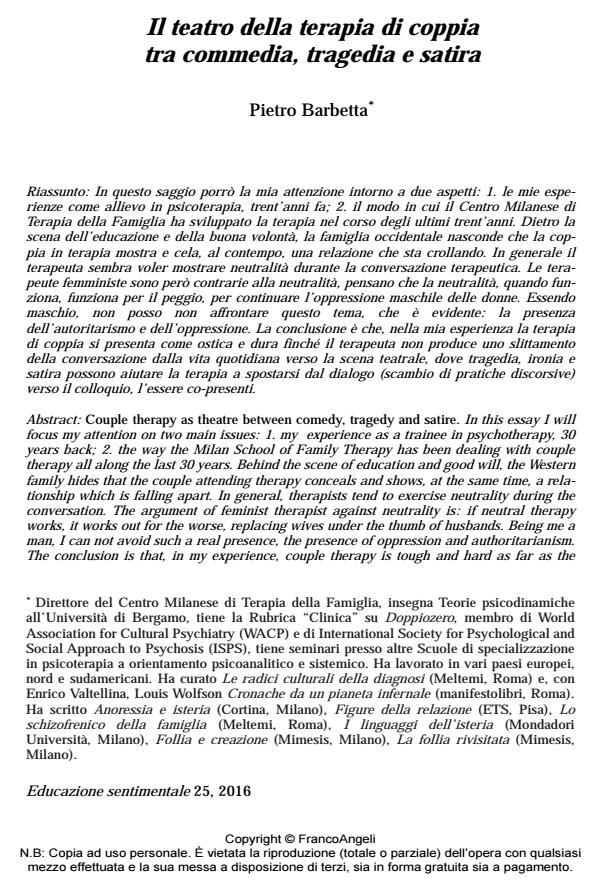Il teatro della terapia di coppia tra commedia, tragedia e satira
Journal title EDUCAZIONE SENTIMENTALE
Author/s Pietro Barbetta
Publishing Year 2016 Issue 2016/25 Language Italian
Pages 10 P. 74-83 File size 65 KB
DOI 10.3280/EDS2016-025006
DOI is like a bar code for intellectual property: to have more infomation
click here
Below, you can see the article first page
If you want to buy this article in PDF format, you can do it, following the instructions to buy download credits

FrancoAngeli is member of Publishers International Linking Association, Inc (PILA), a not-for-profit association which run the CrossRef service enabling links to and from online scholarly content.
Couple therapy as theatre between comedy, tragedy and satire. In this essay I will focus my attention on two main issues: 1. my experience as a trainee in psychotherapy, 30 years back; 2. the way the Milan School of Family Therapy has been dealing with couple therapy all along the last 30 years. Behind the scene of education and good will, the Western family hides that the couple attending therapy conceals and shows, at the same time, a relationship which is falling apart. In general, therapists tend to exercise neutrality during the conversation. The argument of feminist therapist against neutrality is: if neutral therapy works, it works out for the worse, replacing wives under the thumb of husbands. Being me a man, I can not avoid such a real presence, the presence of oppression and authoritarianism. The conclusion is that, in my experience, couple therapy is tough and hard as far as the therapist does not shifts from everyday life to the theatrical scene, where tragedy, irony and satire help therapy to move from dia-logos (exchange of discourse) to being there together (cum-loqui).
Keywords: Thanatos, Eros, theatre, Antigone, Casanova, feminism, neutrality
- Barthes R. (2003). La camera chiara. Torino: Einaudi.
- Bataille G. (1957). L’érotisme. Paris: Minuit.
- Bateson G. (1976). Bali: il sistema dei valori in uno stato stazionario. In: Verso un’ecologia della mente. Milano: Adelphi.
- Boscolo L., Cecchin G., Hoffman L., Penn P. (2004). La clinica sistemica. Torino: Bollati Boringhieri.
- Butler J. (2003). La rivendicazione di Antigone. Torino: Bollati Boringhiri.
- Casanova G. (1965). Storia della mia vita. Milano: Mondadori.
- Foucault M. (1972). Le parole e le cose. Milano: BUR.
- Foucault M. (1978, 1984, 1985). Storia della sessualità. Milano: Feltrinelli.
- Greimas A., Fontanille J. (1996). Semiotica delle passioni. Milano: Bompiani.
- Kermode F. (1979). The Genesis of Secrecy. Cambridge University Press.
- Kermode F. (2000). The Sense of an Ending. Oxford University Press.
- Montani P. (2001). Antigone e la filosofia. Roma: Donzelli.
- Nietzsche F. (2000). Die fröhliche Wissenschaft. Berlin: Reclam.
- Nietzsche F. (2007). Die Geburt der Tragödie. Oder: Griechenthum und Pessimismus. Berlin: Reclam.
- Pearce B. (1993). Comunicazione e condizione umana. Milano: FrancoAngeli.
- Steiner G. (1995). Le Antigoni. Milano: Garzanti.
- Vegetti Finzi S. (1986). Storia della psicoanalisi. Milano: Mondadori.
- von Foerster H. (1987). Sistemi che osservano. Roma: Astrolabio.
Pietro Barbetta, Il teatro della terapia di coppia tra commedia, tragedia e satira in "EDUCAZIONE SENTIMENTALE" 25/2016, pp 74-83, DOI: 10.3280/EDS2016-025006